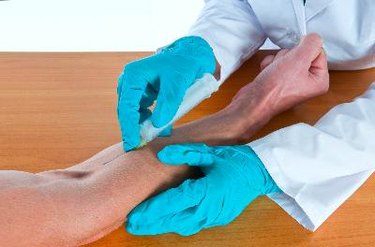
While there are some blood tests that allow you to eat whatever you wish, while others require you to abstain from drinking or eating certain things for a specific period of time prior to testing. Strict adherence to your physician's instructions regarding fasting is essential in order to achieve an accurate reading of your blood work.
Fasting Blood Tests
Video of the Day
There are three main tests that require fasting -- glucose, cholesterol and iron. Cholesterol screenings require you to fast for at least 9 to 12 hours prior to blood work, with a 24-hour break from alcohol prior to testing. Fasting cholesterol blood work tests for LDL or "bad" cholesterol, HDL also known as "good" cholesterol and triglyceride levels. A fasting iron test measures the amount of iron in the body and requires a 5-hour fast prior to blood work, according to the Iron Disorders Institute. Glucose is another test that requires fasting, specifically, 8 hours for a fasting blood glucose or diabetes screening.
Video of the Day
Purpose of Fasting
Because every human body is different, a set standard of fasting lipid values are necessary to determine which levels of glucose, cholesterol and iron are unhealthy. When you fast, your blood levels normalize. Eating or drinking something that contains sugar prior to a glucose test can raise glucose levels in the blood, providing an inaccurate reading. The same holds true for iron and cholesterol blood tests. Harvard Medical School explains that eating before a cholesterol test results in a 20 to 30-percent spike in cholesterol blood levels. Drinking alcohol prior to testing raises triglycerides considerably.
Complete Chemistry Screening
A complete chemistry screening gives your physician a glimpse into your overall health. Also known as a Chem-20, SMAC-20 or SMA-20, the complete chemistry screening includes 20 different screenings from albumin to uric acid. Glucose and cholesterol are often included in the list of 20. Preparations for the complete chemistry screening depend on what your physician is screening for. While some complete chemistry screenings may not require a fasting period, NYU Langone Medical Center explains that under certain circumstances a physician may prefer a fasting period of nine to 12 hours before testing. The complete chemistry screening does allow you to drink water the morning before blood work.
Medications
Some medications blur the outcome of blood tests, altering the result just enough to cause an inaccurate reading. For instance, blood pressure medications, birth control pills and certain corticosteroids may affect the results of a blood test. Iron supplements may affect a fasting iron test and according to the University of Maryland Medical Center, anabolic steroids, sulfonamides, MAO inhibitors and statins may provide your physician with a false reading if you take them before a fasting cholesterol blood test. To avoid inaccuracies in blood work, inform your physician of all medications that you take regularly.
- Iron Disorders Institute: Tests to Determine Iron Levels
- Harvard Medical School: Which Cholesterol Test Should You Get?
- NYU Langone Medical Center; Chemistry Screen; Maria G. Essig, MS, ELS; April 2008
- University of Maryland Medical Center: Cholesterol Test -- Overview
- The Ohio State University Medical Center: Blood Tests